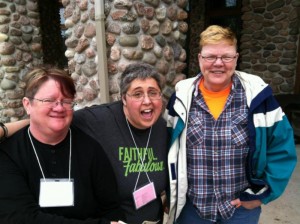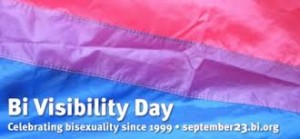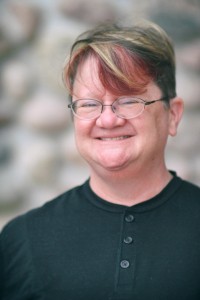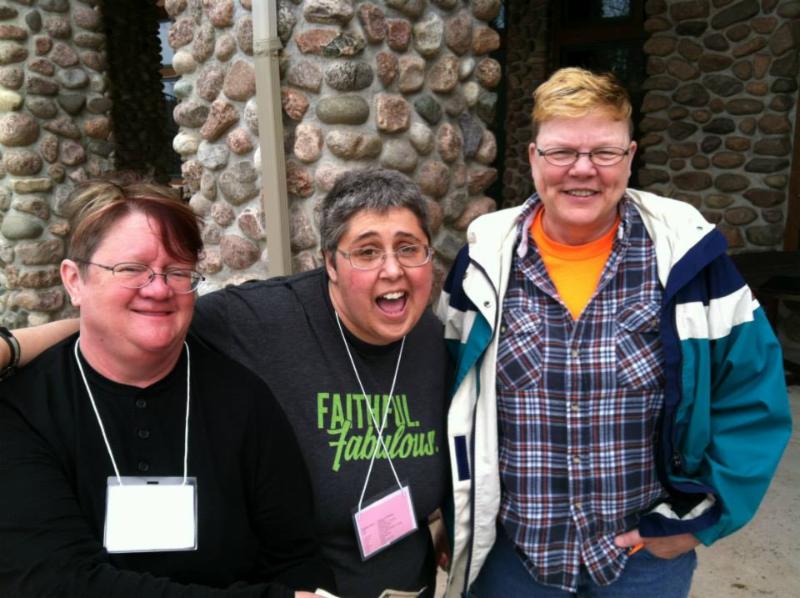by Jean Hay
Today (September 23rd) is bisexual visibility day. And so we have a guest blog from Jean Hay, who is a Proclaim member, a first call candidate in the ELCA, and the mother of a bisexual daughter.

I believe God knew I was gay when calling me to ministry, but I didn’t know at that time. When I entered the candidacy process to become a Lutheran pastor, I was married to a man and our children were in the later years of elementary school.
My (then) husband was a friend to me as I tried to work through this new self-understanding. He and I talked about it a lot, but of course we didn’t share this journey with our children.
But it’s not my story that I want to share with you right now. Rather, I’d like to share my children’s stories of self-discovery. They are both in their early twenties now and have agreed to let me share.
Our first discussion about affectional preferences centered around playground politics. My daughter, the older of the two, relayed a story about someone calling someone else gay as an insult. My son was born fabulously, flamingly, gay. He was too young to put words to his preference, but I wanted to ensure that, at the very least, time with family was a safe time for him to become himself. So, we talked about name-calling, and different ways of being family.
The real surprise for me in that particular conversation was the depth of my daughter’s attachment to hetero-normativity. When she blurted out “at least my monther’s not a lesbian,” I felt it was time to share with the children, that yes, in fact, that was the conclusion I had reached. Her mother is a lesbian.
Divorce, relocation, and economic upheaval followed. It was a tough time for my kids as they headed into adolescence. My daughter, always an avid reader, took comfort in books. She shared the book Luna with me. It is a sister’s story of her older brother’s struggle to become her true self. It is the story of a being family to a transgender sibling. My ex-husband was disturbed by the subject matter of the book. I was so proud of my daughter’s response when she said: “Look at my family, Dad, how can I not be an advocate?”
She had moved from surprise to acceptance to advocacy in the space of a year. She became a charter member of a Gay-Straight Alliance in her middle school. I think that being gay and gender queer can make a boy a target, and I thought it was fabulous that she was willing to be an outspoken ally for kids like her brother.
When she expressed an interest in girls, at first I thought it must have been about me. I thought she must have been identifying with her custodial parent. Losing her dad was hard and he ensured it was a loss and not a transition to a new way of being family.
Just as she had expressed disbelief when I told her I was lesbian, I inwardly expressed disbelief that she was lesbian. I thought I was observing very straight-girl behavior in her. It simply didn’t register that she might be telling me that she was interested in both boys and girls. She started shaving her legs about the same time I stopped. Her friends were mostly other girls. And they giggled a lot and talked about girl-things that still baffle me.
I only started to understand when the number of awkward teen age girls following her home from school matched the number of awkward teenage boys doing the same.
On the one hand, I could explain to seminary classmates that being bisexual wasn’t an imaginary state of being that reflected an inability to decide. On the other, I applied this very definition to my own daughter. “It’s just a stage”, I thought. “She’ll grow out of it.”
Please don’t misunderstand. As a parent, I just wanted my children to grow into their own authentic selves.
Have you heard about the coming out process sometimes being refered to as “bi now, gay later”? That was my route to self-understanding as I tried to reconcile my love for my husband and the growing realization that women caught my attention in a way that they don’t catch every woman’s attention.
 Because it is not uncommon for a person to think they are bisexual as they transition from a hetreosexual self-understanding to a homosexual self-understanding, many people think bisexuality is just a way to ease the transition.
Because it is not uncommon for a person to think they are bisexual as they transition from a hetreosexual self-understanding to a homosexual self-understanding, many people think bisexuality is just a way to ease the transition.
My daughter seemed to make her self-discovery as “gay now, bi later.” Also about this same time in her life, she completed confirmation classes and “graduated” from Christian faith. Given that she had front row seats to my struggle in seminary when sexuality was the only thing people wanted to talk about (2002 -2006), it’s not surprising that she quit the church. My son was probably born to ministry as surely as was born queer, and she also witnessed his interest in church life fade.
But she didn’t just quit the church, she stopped believing in God.
Did I mention that she was (and still is) an avid reader? In middle school, she read the (whole) Old Testament! She wondered why God was jealous and angry. And she decided that God was made in man’s image.
With all my education, with all of my own faith, I have not been able influence her understanding of the Old Testament or her atheism.
We still talk about faith. We still talk about different ways of being in relationship (affectional preferences).
She teaches me what it means to be an atheist. She teaches me what it means to be bisexual. I’ve learned a lot from my daughter, like: A person need not believe in order to talk about God. And a person need not “land” in a hetero- or homo- sexual identity. You can just love who you love.
I love my bisexual, atheist, advocate, daughter. She is helping me prepare to be a better pastor and advocate for all people in our church.
 Jean Hay and her wife Jan live in Minnesota. During the day, she geeks out as a data analyst, but is also a First Call Candidate with the Sierra Pacific Synod and is excited for the day she can serve as a pastor.
Jean Hay and her wife Jan live in Minnesota. During the day, she geeks out as a data analyst, but is also a First Call Candidate with the Sierra Pacific Synod and is excited for the day she can serve as a pastor.


